| Listing 1 - 10 of 13 | << page >> |
Sort by
|
Book
ISBN: 0273603973 9780273603979 Year: 1994 Publisher: London Pitman
Abstract | Keywords | Export | Availability | Bookmark
 Loading...
Loading...Choose an application
- Reference Manager
- EndNote
- RefWorks (Direct export to RefWorks)
519.816 --- Besluitvorming --- E960273.jpg --- Theory of decision-making --- 519.816 Theory of decision-making
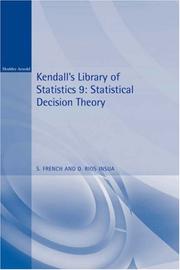
ISBN: 0340614609 9780340614600 Year: 2000 Volume: 9 Publisher: London Arnold
Abstract | Keywords | Export | Availability | Bookmark
 Loading...
Loading...Choose an application
- Reference Manager
- EndNote
- RefWorks (Direct export to RefWorks)
Statistical decision --- 519.816 --- Theory of decision-making --- 519.816 Theory of decision-making --- Decision problems --- Game theory --- Operations research --- Statistics --- Management science
Book
ISBN: 0861720113 Year: 1980 Publisher: London Aldwych press
Abstract | Keywords | Export | Availability | Bookmark
 Loading...
Loading...Choose an application
- Reference Manager
- EndNote
- RefWorks (Direct export to RefWorks)
Library management --- Communicatie in het bibliotheekmanagement --- Communication dans l'administration des bibliotheques --- Communication in library administration --- 025.1 --- 519.816 --- Bibliotheek: leiding, directie. Bibliotheekorganisatie. Bibliotheekmanagement --- Theory of decision-making --- 519.816 Theory of decision-making --- 025.1 Bibliotheek: leiding, directie. Bibliotheekorganisatie. Bibliotheekmanagement --- Academic libraries --- Administration --- Decision making
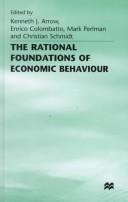
ISBN: 0312127081 0333777263 9780312225667 0312225660 9780333777268 Year: 1999 Volume: 114 Publisher: Hampshire: MacMillan,
Abstract | Keywords | Export | Availability | Bookmark
 Loading...
Loading...Choose an application
- Reference Manager
- EndNote
- RefWorks (Direct export to RefWorks)
Rational expectations (Economic theory) --- Rational choice theory --- Economic man --- Congresses --- 519.816 --- 519.83 --- Theory of decision-making --- Theory of games --- 519.83 Theory of games --- 519.816 Theory of decision-making --- Expectations, Rational (Economic theory) --- Economic forecasting --- Time and economic reactions --- Uncertainty --- Social choice --- Homo oeconomicus --- Human beings --- Economics --- Self-interest --- Rational expectations (Economic theory) - Congresses --- Rational choice theory - Congresses --- Economic man - Congresses
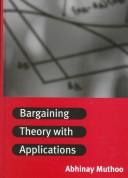
ISBN: 0521576474 0521572258 0511607954 9780521572255 9780521576475 9780511607950 Year: 2002 Publisher: Cambridge Cambridge university press
Abstract | Keywords | Export | Availability | Bookmark
 Loading...
Loading...Choose an application
- Reference Manager
- EndNote
- RefWorks (Direct export to RefWorks)
The first unified and systematic treatment of the modern theory of bargaining, presented together with many examples of how that theory is applied in a variety of bargaining situations. Abhinay Muthoo provides a masterful synthesis of the fundamental results and insights obtained from the wide-ranging and diverse (game-theoretic) bargaining theory literature. Furthermore, he develops new analyses and results, especially on the relative impacts of two or more forces on the bargaining outcome. Many topics - such as inside options, commitment tactics and repeated bargaining situations - receive their most extensive treatment to date. In the concluding chapter, he offers pointers towards future research. Bargaining Theory with Applications is a textbook for graduate students in economic theory and other social sciences and a research resource for scholars interested in bargaining situations.
519.816 --- 519.816 Theory of decision-making --- Theory of decision-making --- Negotiation in business. --- Game theory --- Negotiation in business --- Business --- Management --- Games, Theory of --- Theory of games --- Mathematical models --- Mathematics --- Operational research. Game theory --- Game theory. --- Business, Economy and Management --- Economics
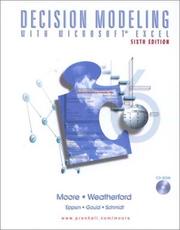
ISBN: 013017789X Year: 2001 Publisher: Upper Saddle River Prentice Hall
Abstract | Keywords | Export | Availability | Bookmark
 Loading...
Loading...Choose an application
- Reference Manager
- EndNote
- RefWorks (Direct export to RefWorks)
Business policy --- 519.816 --- 519.87 --- Management --- -Management science --- 681.3*H42 --- Quantitative business analysis --- Problem solving --- Operations research --- Statistical decision --- Administration --- Industrial relations --- Organization --- Theory of decision-making --- Mathematical models for operational research --- Mathematical models --- Types of systems: decision support (e.g. MIS); logistics (Information systemsapplications --- Management science. --- Mathematical models. --- 681.3*H42 Types of systems: decision support (e.g. MIS); logistics (Information systemsapplications --- 519.87 Mathematical models for operational research --- 519.816 Theory of decision-making --- Management science
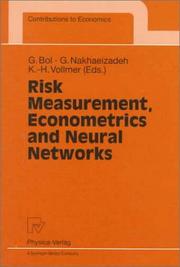
ISBN: 3790811521 3642582729 9783790811520 Year: 1998 Publisher: Heidelberg; New York : Physica-Verlag,
Abstract | Keywords | Export | Availability | Bookmark
 Loading...
Loading...Choose an application
- Reference Manager
- EndNote
- RefWorks (Direct export to RefWorks)
This book comprises the articles of the 6th Econometric Workshop in Karlsruhe, Germany. In the first part approaches from traditional econometrics and innovative methods from machine learning such as neural nets are applied to financial issues. Neural Networks are successfully applied to different areas such as debtor analysis, forecasting and corporate finance. In the second part various aspects from Value-at-Risk are discussed. The proceedings describe the legal framework, review the basics and discuss new approaches such as shortfall measures and credit risk.
Econometrics --- Risk --- congresses --- 519.816 --- #TELE:SISTA --- Theory of decision-making --- Business & Economics --- Economic Theory --- 519.816 Theory of decision-making --- Leadership. --- Computer programming. --- Computer mathematics. --- Econometrics. --- Economics, Mathematical . --- Business Strategy/Leadership. --- Programming Techniques. --- Computational Mathematics and Numerical Analysis. --- Quantitative Finance. --- Economics --- Mathematical economics --- Mathematics --- Economics, Mathematical --- Statistics --- Computer mathematics --- Electronic data processing --- Computers --- Electronic computer programming --- Electronic digital computers --- Programming (Electronic computers) --- Coding theory --- Ability --- Command of troops --- Followership --- Methodology --- Programming --- Econometrics - Congresses --- Risk - congresses --- Gestion de risque

ISBN: 0521556449 0521553903 0511598971 9780521556446 9780511598975 9780521553902 Year: 1996 Publisher: Cambridge Cambridge University press
Abstract | Keywords | Export | Availability | Bookmark
 Loading...
Loading...Choose an application
- Reference Manager
- EndNote
- RefWorks (Direct export to RefWorks)
Cutting a cake, dividing up the property in an estate, determining the borders in an international dispute - such problems of fair division are ubiquitous. Fair Division treats all these problems and many more through a rigorous analysis of a variety of procedures for allocating goods (or 'bads' like chores), or deciding who wins on what issues, when there are disputes. Starting with an analysis of the well-known cake-cutting procedure, 'I cut, you choose', the authors show how it has been adapted in a number of fields and then analyze fair-division procedures applicable to situations in which there are more than two parties, or there is more than one good to be divided. In particular they focus on procedures which provide 'envy-free' allocations, in which everybody thinks he or she has received the largest portion and hence does not envy anybody else. They also discuss the fairness of different auction and election procedures.
National wealth --- Conflict management --- Fairness --- Game theory --- Negotiation --- Gestion des conflits --- Impartialité --- Théorie des jeux --- Négociations --- 330.1 --- 519.816 --- Economische grondbegrippen. Algemene begrippen in de economie --- Theory of decision-making --- Conflict management. --- Fairness. --- Game theory. --- Negotiation. --- 519.816 Theory of decision-making --- 330.1 Economische grondbegrippen. Algemene begrippen in de economie --- Impartialité --- Théorie des jeux --- Négociations --- Impartiality --- Conduct of life --- Justice --- Conflict control --- Conflict resolution --- Dispute settlement --- Management of conflict --- Managing conflict --- Management --- Problem solving --- Social conflict --- Crisis management --- Bargaining --- Dickering --- Haggling --- Higgling --- Negotiating --- Negotiations --- Discussion --- Psychology, Applied --- Games, Theory of --- Theory of games --- Mathematical models --- Mathematics --- Business, Economy and Management --- Economics
Book
ISBN: 0674067541 0674066898 9780674067547 0674071301 9780674066892 Year: 2013 Publisher: Cambridge, Mass. Harvard University Press
Abstract | Keywords | Export | Availability | Bookmark
 Loading...
Loading...Choose an application
- Reference Manager
- EndNote
- RefWorks (Direct export to RefWorks)
Public policy advocates routinely assert that "research has shown" a particular policy to be desirable. But how reliable is the analysis in the research they invoke? And how does that analysis affect the way policy is made, on issues ranging from vaccination to minimum wage to FDA drug approval? Charles Manski argues here that current policy is based on untrustworthy analysis. By failing to account for uncertainty in an unpredictable world, policy analysis misleads policy makers with expressions of certitude. Public Policy in an Uncertain World critiques the status quo and offers an innovation to improve how policy research is conducted and how policy makers use research. Consumers of policy analysis, whether civil servants, journalists, or concerned citizens, need to understand research methodology well enough to properly assess reported findings. In the current model, policy researchers base their predictions on strong assumptions. But as Manski demonstrates, strong assumptions lead to less credible predictions than weaker ones. His alternative approach takes account of uncertainty and thereby moves policy analysis away from incredible certitude and toward honest portrayal of partial knowledge. Manski describes analysis of research on such topics as the effect of the death penalty on homicide, of unemployment insurance on job-seeking, and of preschooling on high school graduation. And he uses other real-world scenarios to illustrate the course he recommends, in which policy makers form reasonable decisions based on partial knowledge of outcomes, and journalists evaluate research claims more closely, with a skeptical eye toward expressions of certitude.
Policy sciences. --- Public administration. --- Decision making. --- Political planning --- Politics and Government. --- Policy sciences --- Public administration --- Decision making --- Social Sciences --- Social Sciences - General --- Evaluation. --- Evaluation --- Planning in politics --- Public policy --- Deciding --- Decision (Psychology) --- Decision analysis --- Decision processes --- Making decisions --- Management --- Management decisions --- Administration, Public --- Delivery of government services --- Government services, Delivery of --- Public management --- Public sector management --- Policy-making --- Policymaking --- Public policy management --- Planning --- Politics, Practical --- Choice (Psychology) --- Problem solving --- Political science --- Administrative law --- Decentralization in government --- Local government --- Public officers --- E-books --- Overheidsbeleid --- 519.816 --- 519.816 Theory of decision-making --- Theory of decision-making --- Science --- Sociology of knowledge
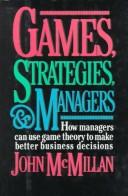
ISBN: 0195108035 0195074300 0195074033 9780195074307 9780195074031 9780195108033 Year: 1992 Publisher: Oxford Oxford university press
Abstract | Keywords | Export | Availability | Bookmark
 Loading...
Loading...Choose an application
- Reference Manager
- EndNote
- RefWorks (Direct export to RefWorks)
Decision Making --- Game theory --- Management --- Management games --- 519.83 --- 519.816 --- 658.012 --- 518.5 --- Deciding --- Decision (Psychology) --- Decision analysis --- Decision processes --- Making decisions --- Management decisions --- Business games --- Industrial gaming --- Industrial management games --- Games of strategy (Mathematics) --- Management. Directorate. Technique and methods of management --- Theory of decision-making --- Planning in het bedrijf --- Operationeel onderzoek. Speltheorie --- Decision making. --- Game theory. --- Management games. --- Jazz musicians --- 519.83 Theory of games --- 65.012.4 Management. Directorate. Technique and methods of management --- 519.816 Theory of decision-making --- Decision making --- 65.012.4 --- Choice (Psychology) --- Problem solving --- Industrial management --- Administration --- Industrial relations --- Organization --- Games, Theory of --- Theory of games --- Mathematical models --- Mathematics --- Simulation methods --- Planning (firm) --- Operational research. Game theory --- Management. --- Biography --- Industrial management. --- Théorie des jeux. --- Prise de décision. --- Jeux d'entreprise. --- Gestion d'entreprise.
| Listing 1 - 10 of 13 | << page >> |
Sort by
|

 Search
Search Feedback
Feedback About UniCat
About UniCat  Help
Help News
News